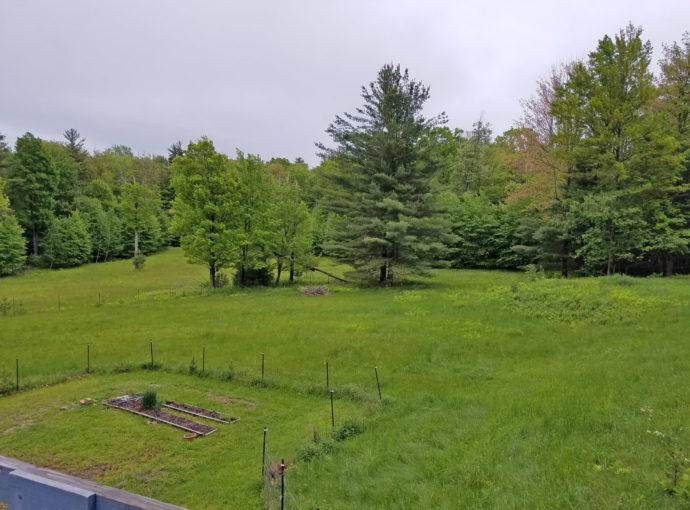Hello, Silence, My Best Friend


Confession time: I am spoiled.
For the past 17 years, I’ve lived in the rural-est of rural neighborhoods, down a road-less-traveled, dead-end gravel street, on 7.5 acres, surrounded by white pine woods and hay fields, and expanses of sky so wide-open, it seems as if I can breathe in all the constellations on a dark night. My nearest neighbors, whose names I don’t even know, are just far enough away that when the leaves unfurl on the trees in summer, I can barely make out their house. On a busy day, five or six cars, and perhaps a UPS truck or a big, rusty farm tractor, toddle up or down the road.
I have privacy. I have clean air and tons of room to move. I have chirping birds, crickets, and frogs for companions, and breezes that on gusty days play the trees like tambourines.
And I have silence.
The silence may just be what I like best about where I live. It’s why I put up with the fact that I have to haul my own trash to the transfer station, that I often have to wait for hours to get plowed out during a heavy snowstorm, and that it takes me 30 minutes to drive anywhere that has normal-people services like grocery stores and movie theaters. This woodsy silence isn’t like the utter—and eerie—lack of sound you often find in desert states, but a quiet, white noise–like calm that allows my shoulders to relax, my lungs to open, and my breathing to deepen.
So when my partner recently got job offers in three different cities—North Andover, Massachusetts, near Boston; Fremont, California, near San Jose; and Corning, New York, near Ithaca—my reaction was harsh and immediate: Oh, hell, no.
While a sentimental attachment to my home was definitely part of it, a more significant part was the idea that I’d have to move to a place where the population of the neighborhoods is much denser, and the houses are close enough together that you can see the neighbors from your window and hear the chattering of kids playing or adults trading pleasantries over their morning Starbucks. Not to completely trash children, Starbucks-loving adults, or pleasantries, but when the hell did I sign up for any of that? I’ll take my silence with a side of silence, please and thank you.

For reference, here’s where I live now. Visiting friends have complained that it’s “too quiet” for them to fall asleep at night.
My partner says he understands my need for distance and quiet, though his frame of reference is a lot different. A native Spaniard, he grew up in a Madrid, an enormous city full of apartment buildings so closely packed, you can reach out your window and press your hand against the sun-warmed bricks next door, and where noise—whether from human voices, music, the metallic clang of kitchen utensils, traffic, or heavy machinery—is a constant. Although he has come to appreciate the way we live now, he’s far more tolerant of proximity to people and sound. If it weren’t for me, he’d happily live in a condo with a matchbook-size backyard, and find a way to block out any street noise without even trying.
But me, I’ve turned down good jobs because they refused to give me an office with a door. I’ve told gleefully shouting children in public parks to take it down a few notches. I’ve effectively eliminated some of his job prospects—hello, Fremont!—because there was no way to live on a normal-people salary and not be sitting on my neighbor’s lap. (My rule: if I can see into their windows from my own, I’m too close.) In the current circumstance, I feel pretty guilty about influencing my partner’s choices based on this weird, innate need, which I had chalked up to middle-aged crankiness or New England crustiness. But it turns out I was on to something.
A 2011 World Health Organization report calls noise pollution a “modern plague,” and notes that what we’ve come to live with as the ambient noise of cities—not just the noise of airports and highways, as studies from the 1960s pointed out—can not only cause regular sleep disturbances (and distraction during the following 24 hours) but also can have “both temporary and permanent effects on humans (and other mammals) by way of the endocrine and autonomic nervous systems.” The report continues, “It has been postulated that the noise acts as a nonspecific biologic stressor eliciting reactions that prepare the body for a fight or flight response,” and can even be a risk factor for cardiovascular disease, and the acceleration or intensification of a host of mental disorders.
Beyond this, noise pollution impairs task performance in a variety of environments, including school and work, increasing errors and decreasing attention, motivation, problem solving, and memory. For a writer, to whom distraction is the devil, constant exposure to noise doesn’t just mean irritability and tension, but an inability to complete work assignments.
As this thought piece on The Walrus points out, “According to the World Health Organization, six out of every ten people will live in cities by 2030. No reversal of the trend is in sight. And as the city continues to draw us to itself, like some enormous, concrete siren, we begin to convince ourselves that this crowded existence is the only ‘natural life, that there is nothing for us beyond the walls of Jericho.’”
But there is an alternative.
Silence, studies prove, releases tension. Even just a few minutes of silence is “more relaxing than listening to ‘relaxing’ music.” Silence can restore the brain’s finite cognitive resources, which become depleted with overstimulation, and allow the brain to free-associate and be creative—essential aspects not just of the writer’s job, but of the human existence.
Now that I know “prolonged and repeated exposure to silence may result in improved health, just like prolonged and repeated exposure to noisiness can result in poorer health,” I feel a little less uncomfortable about my insistence on finding a place where I can be quiet. Whether I want silence because of grouchiness, a spoiled nature, or a desire to distance myself from things that go bump, clang, and beep-beep-beep in the night, it’s really not a bad inclination. And if it makes me healthier and more productive, how much can I self-criticize?
Herman Melville wrote, “All profound things and emotions of things are preceded and attended by Silence.” I’ll see that sentiment and raise it an Every day. Every day.